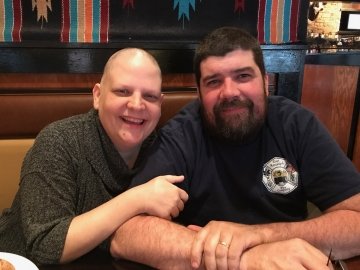Help For Navigating Your Medical Conditions

Our personal health support team is available to help all our members. Read about how a nurse case manager guided a member through a scary ride with cancer.
Dealing with a complex medical condition is like being on a long journey. There are often many twists and turns to steer through — and important decisions to make — before reaching the endpoint of regaining your health.
When Marcey Hannon was diagnosed in 2016 with anaplastic large cell lymphoma, a rare type of blood cancer, she knew she needed help navigating the challenging health journey. Marcey enlisted Blue Cross Vermont’s personal health support team to assist her. The team, made up of registered nurses and licensed clinicians, helps our members get the right treatment at the right time. The team’s personal health support services are free and available to all our members.
Marcey’s case manager coordinated her care, answered her questions, and provided educational resources. The case manager also gave advice and encouragement. “They were a huge help in making good healthcare decisions, as well as a support to lean on,” says Marcey, who lives in Randolph and works for us as a project manager.
A Scary Ride
Marcey was already familiar with our personal health support team, as they had previously helped her with two other complex health situations:
- After surgery to fix a back issue about 20 years ago, she developed a staph infection. Her case manager coordinated home care, which included drug infusion therapy, and recommended exercises to help make her back stronger.
- In 2015, Marcey was diagnosed with diabetes. With coaching from her case manager, she was able to gradually incorporate changes into her lifestyle to successfully control her diabetes.
Those two earlier health journeys with a Blue Cross Vermont case manager at her side helped prepare Marcey for the scariest ride of her life — a three-year battle with lymphoma.
When you are diagnosed with cancer, you hear what the doctor is saying but you don’t really absorb it, Marcey recalls. There’s a lot of information coming at you all at once and it can be overwhelming. “You're trying to come to grips with the fact that you've got this cancer diagnosis and what you should do next,” she says.

Reaching out to the Blue Cross Vermont personal health support team helped Marcey learn about treatment options and determine what her next steps should be. Her case manager encouraged her to get a second opinion and connected her with leading cancer hospitals. With her case manager’s help, she started on the best course of treatment.
One of the most valuable things Marcey’s case manager did was serve as a sounding board when issues arose. For example, when Marcey had a fever — a side effect of chemotherapy — she could ask her case manager if it was normal or something she should alert her doctor to.
After chemotherapy, the cancer was in remission, but within a year she had a recurrence. Marcey’s doctors wanted her to undergo a stem cell transplant to replace damaged cells and enable her bone marrow to produce healthy blood cells. The procedure would mean being hospitalized for several weeks. Marcey asked her case manager whether she should go to Boston for the procedure, or if there was a hospital closer to home where she could get the transplant done. Her case manager recommended doing the procedure at Dartmouth-Hitchcock Medical Center in Lebanon, N.H., only 45 minutes away from Marcey’s house, which would enable her family to visit often and provide support during the lengthy inpatient stay.
Providing Emotional Support
In addition to helping Marcey navigate the health system, her Blue Cross Vermont case manager provided her with emotional support.
Along with scheduled check-ins with her case manager, Marcey was encouraged to call whenever she had a question or concern. “I didn't necessarily have to have a big reason to call,” Marcey says. “If it wasn't a regular check-in day, I could call and say, ‘I just feel this certain way today’ and talk it through.”
Her case manager helped relieve a lot of the anxiety and stress of coping with such a serious illness, Marcey says. “The case manager was definitely a lifeline to talk through those feelings of hopelessness that you just get caught up with when you're fighting for your life,” she says.
Marcey was encouraged by her case manager to keep a journal of how she felt after chemotherapy, so she could discuss the symptoms later with her doctor. With the journal in hand, “I was able to create plans with my doctor to avoid some side effects of the medicines I was on. That was really helpful.”
Marcey’s cancer has been in remission since 2019, and she says the Blue Cross Vermont personal health support team was key to her successful recovery. If her doctor suggested that she get a certain procedure, she was able to discuss it with her case manager before making a decision. “It was good to have someone to just bounce my decisions off,” Marcey says. “Your case manager is able to look at the big picture and help you make those decisions that are necessary in order to move your health care forward.”
Get Help Managing Your Health
Whether you are dealing with cancer, need help managing a chronic condition like diabetes or heart disease, or are struggling with a mental health issue, our personal health support team is available to help you and provide support. You can call them at (800) 922-8778, option 3, or use the Member Resource Center to send a secure message to case management.
“One of the things that I would encourage members is to do is engage with a Blue Cross Vermont case manager as soon as possible,” Marcey says. “They’re a lifeline to navigating the healthcare journey, all the way through to recovery. Whether it's something that you think is small or something that’s a larger issue, your case manager will be able to handle it.”
Learn more about our personal health services.



